The Japan Foundation Awards (2024)
The Japan Foundation (JF) is proud to announce the recipients of the Japan Foundation Awards 2024.
This year marks the 51st anniversary of the Japan Foundation Awards, which were launched in 1973, the year after the establishment of the Japan Foundation. For the past 50 years, the Foundation has presented the Japan Foundation Awards to individuals and organizations that have made significant contributions to promoting international mutual understanding and friendship between Japan and other countries through academic, artistic, and other cultural pursuits.
For 2024, the three recipients listed below have been selected after the screening of 60 candidates nominated by experts and the general public.
The Japan Foundation Awards 2024 Commemorative Events
Archived videos are available on YouTube.
The Japan Foundation Awards 2024 Commemorative Event: Japanese-Language education in Mongolia
The Japan Foundation Awards 2024 Commemorative Event: How Japanese arts and cultures make us happier
Read related articles in Wochi Kochi Magazine.
- The 51st Japan Foundation Awards Report on the 2024 Japan Foundation Awards Ceremony

- Weaving Memories of Existence: Chiharu Shiota on What It Means to Live
In conversation with Chiharu Shiota upon her receipt of the Japan Foundation Award
- Japanese Language Education in Mongolia and the History of the Association of Japanese Language Teachers of Mongolia

- How Japanese Arts and Cultures Make Us Happier

SHIOTA Chiharu (Artist) [Japan]
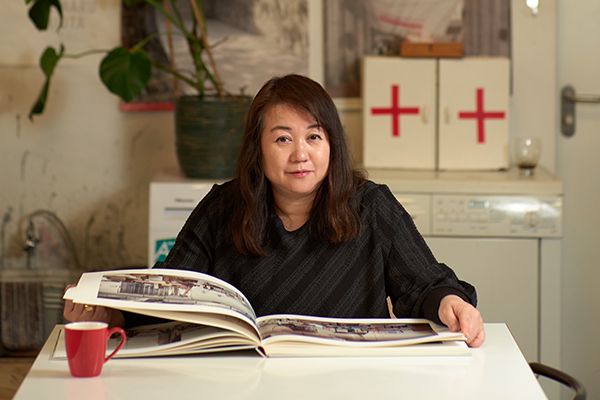
Chiharu Shiota
Berlin, 2023
Photo by Sunhi Mang
SHIOTA Chiharu is a Berlin-based artist who is active internationally.
Since making her debut she has consistently deepened her expression while confronting the fundamental theme of “life and death.” A work she produced while studying in Germany in 1997, in which she employed her own body as a component of the work and wrestled with mud, marked her starting point as an artist. “During Sleep,” which she unveiled at Switzerland’s Museum of Art Lucerne in 2002, was a work in which 30 hospital beds were placed in a space that was woven in black thread, to the point of almost blacking it out, and it presented a direct expression of “life and death”, including through a performance that involved the artist sleeping. In addition, upon visiting Berlin eight years after the fall of the Berlin Wall, Shiota created “Inside – Outside” (2008), a work in which windows collected from demolished buildings and other locations were stacked up highly in a wall configuration. The structure, which makes it possible for viewers to gaze at one another while separated between ‘that side’ and ‘this side,’ recalls the history and narrative of humankind, which are marked by differing views.
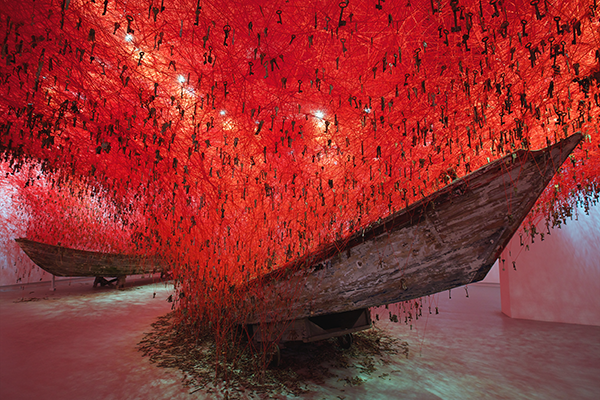
Chiharu Shiota
The Key in the Hand, 2015
Installation: old keys, wooden boats, red wool
Japan Pavilion at 56th Venice Biennale, Venice, Italy
Photo by Sunhi Mang
(c)JASPAR, Tokyo, 2024 and Chiharu Shiota
Through installations conveying powerful messages such as this, she began presenting her works in various German cities while studying at the Berlin University of the Arts from 1999, and the sphere of her activities steadily widened to include Europe, the US and Asia. Since taking part in the International Biennial of Contemporary Art of Seville in 2004 she has also participated in international exhibitions on almost an annual basis. Among those exhibitions, “The Key in the Hand,” a work that she presented at the Japan Pavilion of the International Art Exhibition – La Biennale di Venezia, was composed by tied keys that had been gathered from people around the world with a mass of red threads that fully covered the space. Along with the intense visual impact created by the work, which resembled a blaze that had erupted, many of those who saw it were charmed by its masterful expression of unified memories, in the form of people’s wishes and thoughts lying hidden in the work’s 180,000 keys.
Having made her way to Berlin from Japan on her own, Shiota has established a solid position as a Japanese artist living in Germany. The entire world forms a stage for her creations, and those activities themselves put international exchange into practice. Simultaneously, she has also emerged as a major driving force encouraging women to flourish internationally. Against the backdrop of this remarkable track record, we expect Shiota to continue to make great strides in the future also, and accordingly, we believe she is a worthy recipient of the Japan Foundation Award.
Association of Japanese Language Teachers of Mongolia [Mongolia]
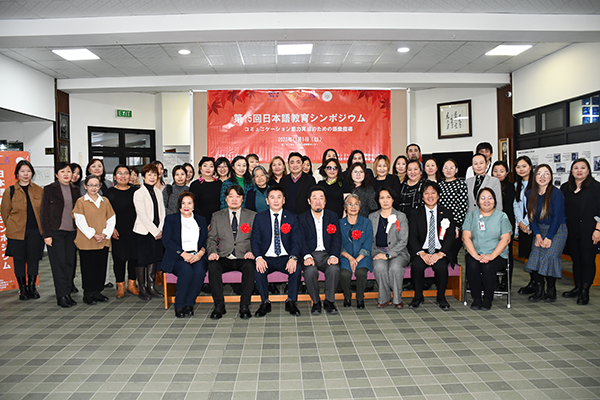
Japanese Language Education Symposium
The Association of Japanese Language Teachers of Mongolia’s activities are contributing significantly to the development and popularization of Japanese language education throughout Mongolia. The history of Japanese language education in Mongolia begins with the launch in 1975 of a Japanese language course at the National University of Mongolia’s Department of Literature, and has since developed and spread broadly from elementary and secondary educational institutions through to higher educational institutions.
The Association of Japanese Language Teachers of Mongolia was set up in 1993 and was registered with the Ministry of Justice and Internal Affairs of Mongolia in 1998. Currently it has 363 members and is supporting Japanese language education within Mongolia. One of its core activities is holding Japanese language speech contests with the cooperation of the Embassy of Japan in Mongolia, the Mongolia-Japan Center for Human Resources Development, Association of Japanese in Mongolia, and the Japanese Business Council of Mongolia. In addition, it is also proactively involved in hosting and co-hosting Japanese Language Education Symposiums, and is striving to strengthen the expertise of Japanese language teachers and improve the level of Japanese language education. It publishes the journal "Japanese Language Education in Mongolia" and supports academic research on the Japanese language and Japanese language education. As the implementing agency for the Japanese-Language Proficiency Test, since 2000 the Association has been holding the test in Ulaanbaatar City twice a year and in Arvaikheer City and Darkhan City once a year. Furthermore, it also undertakes the development of educational materials for elementary and secondary educational institutions based on the JF Standard for Japanese-Language Education. It has completed producing the “Nihongo Dekirumon” series of textbooks, which have had a major impact on Japanese language education within Mongolia, and is working to popularize them widely.
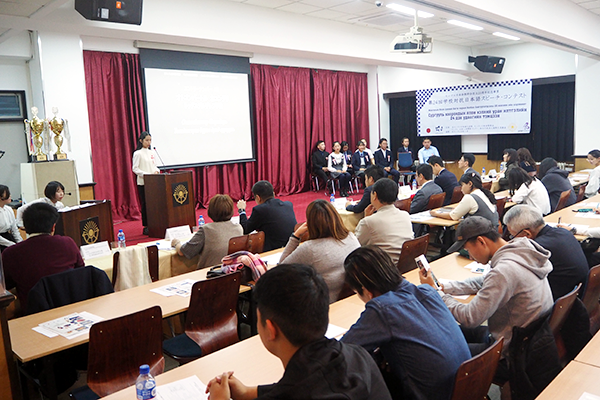
Interschool Japanese Language Speech Contest
The Association held a diverse range of Japanese language education-related events in FY2023, including the 7th Kanji Nadaam, 15th Japanese Language Symposium and the 29th Interschool Japanese Language Speech Contest, as part of its efforts to encourage understanding for Japan and advance the relationship between the two countries. In order to promote the exchange of theory and practice in Japanese language education, it is working with the National University of Mongolia to compile a catalog of "Japanese Studies in Mongolia."
In this way, the Association of Japanese Language Teachers of Mongolia has been contributing to the promotion of international mutual understanding for many years through its close collaboration with Japanese language educational institutions and teachers throughout Mongolia, and that track record is worthy of the Japan Foundation Award. We chose to present the Japan Foundation Award to the Association in expectation of its further activity and development in the future.
The Sainsbury Institute for the Study of Japanese Arts and Cultures (SISJAC) [U.K.]

The Sainsbury Institute for the Study of Japanese Arts and Cultures (SISJAC) is a research institution that was founded in the UK city of Norwich in 1999 through the financial support of Sir Robert and Lady Sainsbury, to promote research, publication and exchanges relating to Japanese arts and cultures. The Institute, which celebrates its 25th anniversary this year, is currently evolving as one of the largest research institutions in Europe for promoting knowledge and understanding of Japanese arts and cultures.
Its library collection boasts over 50,000 historical records relating to Japanese arts, cultures, archeology and other fields, and more than 90 individuals have been enrolled at the Institute since its founding, if fellows and visiting researchers from around the world are combined. As an open organization the Institute also undertakes many society-focused activities, and hosts public lectures on the third Thursday of each month. Over 250 such lectures have been held already. In 2022 the Institute held an exhibition of Jomon Period flame pots and earthen figures, which are the specialty of Professor Simon Kaner, Executive Director of the Institute. The exhibition, which was titled “Circles of Stone: Stonehenge and Prehistoric Japan,” received favorable reviews worldwide, including Japan.
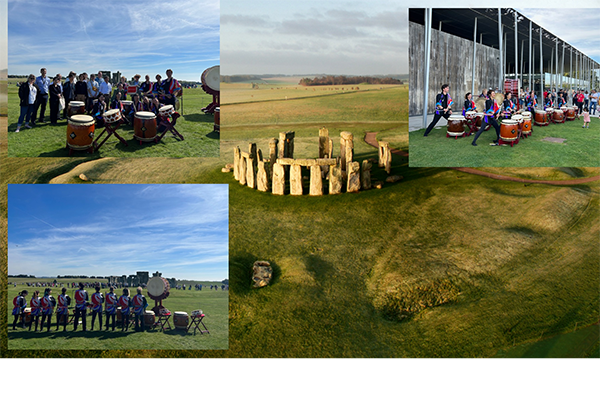
Stonehenge Exhibition
The Sainsbury Institute for the Study of Japanese Arts and Cultures is also enthusiastically undertaking academic exchanges with related research institutions around the world, including Japan. It is ramping up this collaboration through researcher exchanges, international workshops and joint projects with the University of London, School of Oriental and African Studies (SOAS), The British Museum, University of Tokyo, Chuo University, Gakushuin University, Kokugakuin University, Ritsumeikan University and other leading institutions. Worth noting even among such collaboration is its educational partnership with the University of East Anglia, a partnership that led to the setting up of the Centre for Japanese Studies (CJS) in 2011, and extended to the establishment of an “MA in Interdisciplinary Japanese Studies” course from 2020.
In line with the times, the Sainsbury Institute for the Study of Japanese Arts and Cultures is also moving proactively ahead with the digitalization of the Institute’s collection and historical records, and working towards making it possible to view them from anywhere in the world. In recent years it has also been displaying flexibility by expanding its areas of interest to include manga, anime and other topics in line with the demands of younger generations. In this way, the Institute promises to be immensely active as a core institution of Japanese research in Europe from here on also, and accordingly, we consider it worthy of being awarded the Japan Foundation Award.
- The Japan Foundation Awards
- The Japan Foundation Awards Recipients, Presentation Ceremony and Commemorative Events in Previous Years
[Contact Us]
The Japan Foundation Public Relations Div.
Tel. +81-(0)3-5369-6075
Fax: +81-(0)3-5369-6044
Email: kikinsho@jpf.go.jp
(When sending an e-mail, please replace the full-width "@" character with a half-width character.)
- What We Do Top
- Arts and Cultural Exchange [Culture]
- Japanese-Language Education Overseas [Language]
- Japanese-Language Education Overseas [Language] Top
- Learn Japanese-language
- Teach Japanese-language
- Take Japanese-Language Test
- Know about Japanese-language education abroad
- The Japanese-Language Institute, Urawa
- The Japanese-Language Institute, Kansai
- Japanese-Language Programs for Foreign Specified Skilled Worker Candidates
- Japanese Language Education for Japanese Children Resident Overseas and for the Descendants of Migrants
- Archives
- Japanese Studies and Global Partnerships [Dialogue]
- JF digital collection
- Other Programs / Programs to Commemorate Exchange Year
- Awards and Prizes
- Publications
